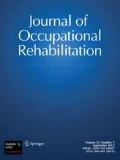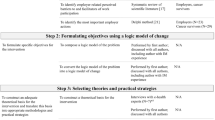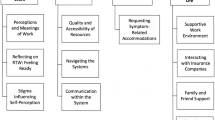Abstract
Background: For employed cancer survivors, returning to work and maintaining employment is an important aspect of their quality of life. We developed an intervention aimed at enhancing this by means of (a) providing the patient with an educational leaflet on return to work and (b) enhancing communication between attending and occupational physicians. The purpose of this study is to test the feasibility of this intervention and to examine the relation of patient adherence to the advice of the leaflet and return to work. Methods: A patient series of 35 employed cancer survivors was used to evaluate the intervention. Survivors completed a baseline questionnaire prior to their treatment. Survivors and occupational physicians were interviewed by telephone eight weeks following all curative treatment. Our measure of feasibility included satisfaction of survivors with the intervention, adherence to the advice, time to return to work, satisfaction of occupational physicians with the intervention, and perceived influence on their rehabilitation efforts. Results: Interviews of 26 survivors and 24 occupational physicians, revealed that those groups perceived the leaflet as useful (i.e., 7 on a 0–10 scale. Also seven out of ten suggestions in the leaflet was adhered to and half of the occupational physicians perceived the guidance they provided was helpful. However there was no effect of level of adherence on actual return to work. Conclusion: This pilot study demonstrated the feasibility of the approach used. However level of adherence to eduactional leaflet was not associated with an improvement in return to work in cancer survivors.
Similar content being viewed by others
References
Sprangers MA. Quality-of-life assessment in oncology. Achievements and challenges. Acta Oncol 2002;41:229–37.
Bowling A. What things are important in people's lives? A survey of the public's judgements to inform scales of health related quality of life. Soc Sci Med 1995;41:1447–62.
Ferrell BR, Grant MM, Funk B, Otis-Green S, Garcia N. Quality of life in breast cancer survivors as identified by focus groups. Psycho oncol 1997;6:13–23.
Meyer TJ, Mark MM. Effects of psychosocial interventions with adult cancer patients: a meta-analysis of randomized experiments. Health Psychol 1995;14:101–8.
Petersson LM, Berglund G, Brodin O, Glimelius B, Sjoden PO. Group rehabilitation for cancer patients: satisfaction and perceived benefits. Patient Educ Couns 2000;40:219–29.
Berglund G, Bolund C, Gustavsson UL, Sjoden PO. Starting again–a comparison study of a group rehabilitation program for cancer patients. Acta Oncol 1993;32:15–21.
Berglund G, Bolund C, Gustafsson UL, Sjoden PO. One-year follow-up of the ‘Starting Again’ group rehabilitation programme for cancer patients. Eur J Cancer 1994;30A:1744–51.
Cole RP, Scialla SJ, Bednarz L. Functional recovery in cancer rehabilitation. Arch Phys Med Rehabil 2000;81:623–7.
Verbeek J, Spelten E, Kammeijer M, Sprangers M. Return to work of cancer survivors: a prospective cohort study into the quality of rehabilitation by occupational physicians. Occup Environ Med 2003;60:352.
Kremer AM, Wevers CWJ. Kanker in relatie tot werk [cancer in relation to work]. Tijdschrift voor bedrijfs- en verzekeringsgeneeskunde 2003;11:231–7
Maunsell E, Brisson C, Dubois L, Lauzier S, Fraser A. Work problems after breast cancer: an exploratory qualitative study. Psychooncology 1999;8:467–73.
Siegert RJ, Taylor WJ. Theoretical aspects of goal-setting and motivation in rehabilitation. Disabil Rehabil 2004;26:1–8.
Barnes MP, Ward AB. Textbook of rehabilitation medicine. Oxford: Oxford University Press 2000.
McLellan DL. Introduction to rehabilitation. In Wilson BA, McLellan DL, editors. Rehabilitation studies handbook. Cambridge: Cambridge University press 1997. pp. 1–19.
Gard G, Larsson A. Focus on motivation in the work rehabilitation planning process: a qualitative study from the employer's perspective. J.Occup Rehabil 2003;13:159–67.
Ostelo RW, de Vet HC, Berfelo MW, Kerckhoffs MR, Vlaeyen JW, Wolters PM, Van Den Brandt PA. Effectiveness of behavioral graded activity after first-time lumbar disc surgery: short term results of a randomized controlled trial. Eur Spine J 2003;12:637–44.
Van Der Klink JJ, van Dijk FJ. Dutch practice guidelines for managing adjustment disorders in occupational and primary health care. Scand J Work Environ Health 2003;29:478--87.
Spelten ER, et al. Cancer, fatigue and the return of patients to work-a prospective cohort study. Eur J Cancer 2003;39:1562–67.
Nieuwenhuijsen K, et al. Validation of performance indicators for rehabilitation of workers with mental health problems. Med Care 2005;43:1034--42.
Verbeek JH. How can doctors help their patients to return to work? PLOS Medicine 2006. In press.
Nieuwenhuijsen K, et al. Predicting the duration of sickness absence for patients with common mental disorders in occupational health care. SJWEH 2006. In press.
Steenstra IA, et al. Prognostic factors for duration of sick leave due to low-back pain in dutch health care professionals. J Occup Rehab 2005;15:591–605.
Acknowledgement
We are grateful to the cancer survivors and physicians who contributed their time and efforts to the study and to Marije Brouwer who contributed to the logistics of the study. Informed consent: All cancer survivors provided informed consent prior to enrollment in the study.
Author information
Authors and Affiliations
Corresponding author
Rights and permissions
About this article
Cite this article
Nieuwenhuijsen, K., Bos-Ransdorp, B., Uitterhoeve, L.L.J. et al. Enhanced Provider Communication and Patient Education Regarding Return to Work in Cancer Survivors Following Curative Treatment: A Pilot Study. J Occup Rehabil 16, 647–657 (2006). https://doi.org/10.1007/s10926-006-9057-9
Published:
Issue Date:
DOI: https://doi.org/10.1007/s10926-006-9057-9




